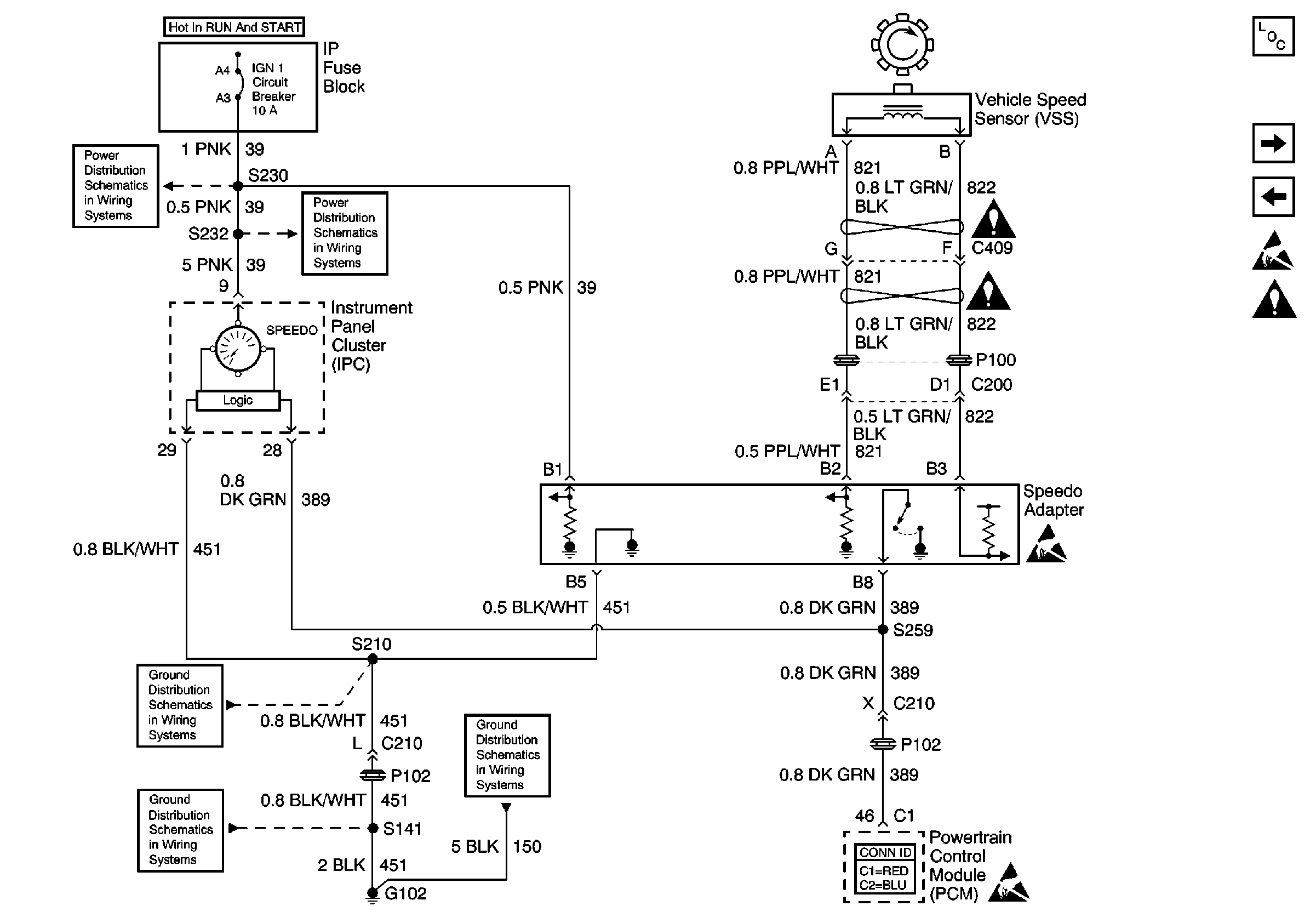Refer to Engine Controls Schematics
VSS

Circuit Description
The Vehicle Speed Sensor (VSS) circuit is of the magnetic induction type. The gear teeth are pressed on the outside diameter of the output shaft assembly. The gear teeth induce an alternating current in the sensor as the shaft rotates. The signal goes to the Speedo Adapter Module then directly to the PCM. This pulsing action takes place about 40 times per revolution of output shaft of transmission. The PCM calculates the vehicle speed based on the time between pulses.
Conditions for Running the DTC
| • | No MAP DTCs |
| • | Vehicle speed is 0 mph |
| • | Engine coolant temperature above 60°C (140°F) |
| • | Engine speed is at least 1400 but no more than 4400 RPM. |
| • | MAP below 20 kPa |
| • | TP is less than 3.125 percent. |
Conditions for Setting the DTC
The following conditions will set the DTC:
PCM detects vehicle speed at 0 mph for 110 seconds, or more.
Action Taken When the DTC Sets
| • | The PCM illuminates the malfunction indicator lamp (MIL) when the diagnostic runs and fails. |
| • | The PCM records the operating conditions at the time the diagnostic fails. The PCM stores this information in the Freeze Frame and the Failure Records. |
Conditions for Clearing the MIL/DTC
| • | The PCM turns the MIL OFF after 3 consecutive drive trips that the diagnostic runs and does not fail. |
| • | A last test failed (current DTC) clears when the diagnostic runs and does not fail. |
| • | A History DTC clears after 40 consecutive warm-up cycles, if this or any other emission related diagnostic does not report any failures. |
| • | The PCM battery voltage is interrupted. |
| • | Use a scan tool in order to clear the MIL/DTC. |
Diagnostic Aids
Check proper calibration for the speedometer.
Test Description
The numbers below refer to the step numbers in the diagnostic table.
-
This step determines if the DTC P0500 is the result of a hard failure or an intermittent condition.
-
This step checks the wiring, the connections, the PCM, and the VSS.
Step | Action | Value(s) | Yes | No |
|---|---|---|---|---|
1 |
Important: Before clearing DTCs, use the scan tool in order to record the freeze frame and the failure records for reference because the Clear Info function will lose the data. Was the Powertrain On-Board Diagnostic (OBD) System Check performed? | -- | ||
Is the voltage constant? | -- | |||
3 | Does the voltage vary? | -- | Go to Diagnostic Aids | |
4 | Does the voltmeter read NO voltage? | -- | ||
Does the voltage vary with the RPM? | -- | |||
6 | Replace the Vehicle Speed Sensor. Is the action complete? | -- | -- | |
7 |
Was a problem found? | -- | ||
8 |
Was a problem found? | -- | ||
9 | Repair the connection as necessary. Refer to Wiring Repairs in Wiring Systems. Is the action complete? | -- | -- | |
10 | Repair the open or short as necessary. Refer to Wiring Repairs in Wiring Systems. Is the action complete? | -- | -- | |
11 | Replace the Speedo Adapter Module. Refer to Vehicle Speed Sensor Module Replacement . Was a problem found? | -- | ||
12 |
Important: Program the new PCM. Replace the PCM. Refer to Powertrain Control Module Replacement . Is the action complete? | -- | -- | |
13 |
Does the scan tool indicate that this diagnostic ran and passed? | -- | ||
14 | Using the scan tool, select the Capture Info and the Review Info. Are any DTCs displayed that have not been diagnosed? | -- | Go to the applicable DTC table | System OK |
